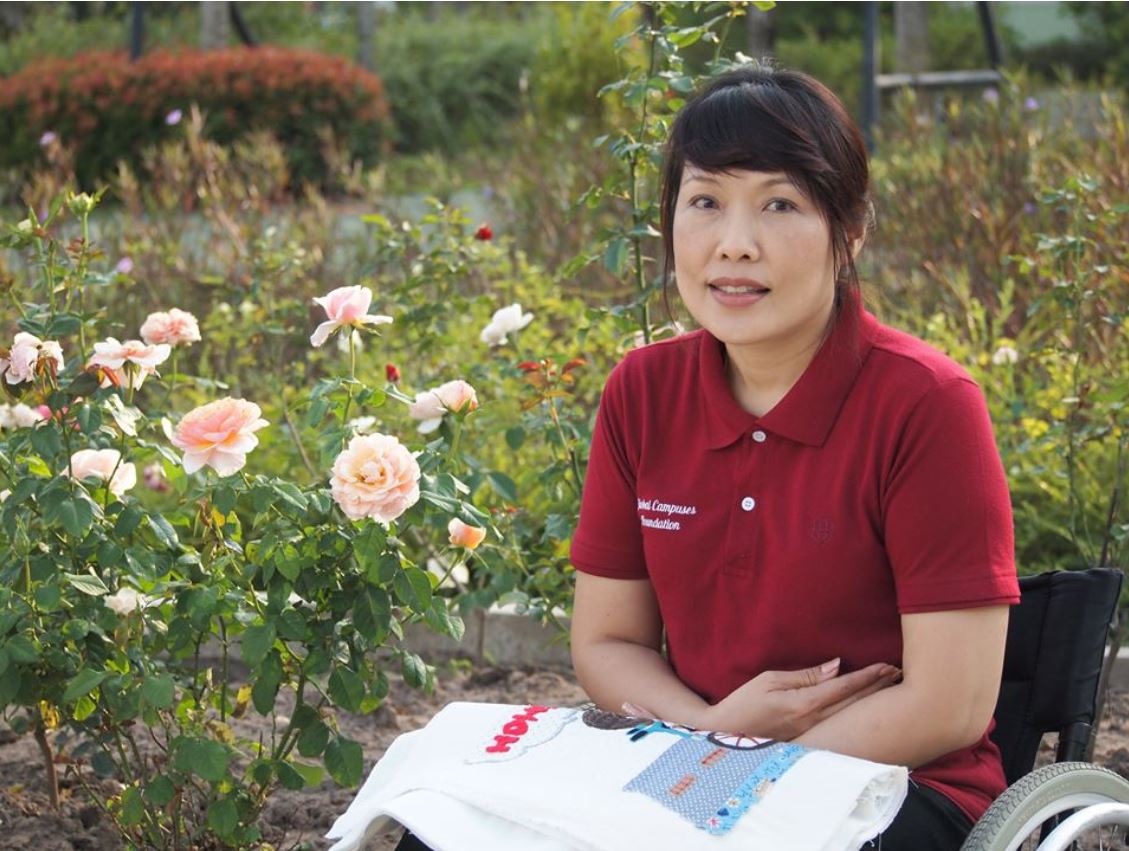
Katchakorn Thawisri, Woman Human Rights Defender working on the rights of disabled people, from the Global Campus Chiang Mai Foundation
Women with disability/ Women Human Rights Defenders: Double harsh reality in the time of COVID19
Pranom Somwong from Protection International, Thailand (an organisation which supports community activists) reports on the situation of disabled women in the time of COVID-19.
“Women and girls with disabilities constitute up to three quarters of persons with disabilities in low- and middle-income countries. They repeatedly face barriers to their meaningful participation and inclusion in mainstream gender, race and class work, at levels of decision making in the family, community, at national and international levels.
“These exclusions, barriers, and discrimination apply also to the COVID-19 pandemic and its response. Women and girls with disabilities may have increased risk for exposure to and complications of COVID-19, and are disproportionately affected by the undesirable impacts of quarantine measures.
Nevertheless, women with disability are also a change maker and rights defender. Protection International, Thailand talked to Katchakorn Thawisri, Woman Human Rights Defender working on the rights of disabled people, from the Global Campus Chiang Mai Foundation.
“I have a sister, our colleague, who has severe disability. Her house is a grocery shop and she lives with her mother who is quite old. Before the COVID-19 spread, her mother fell and became disabled. Her household then has two women with severe disability. When the COVID-19 hit, then no one came and buy stuff at her shop. She and her mother were badly affected and living in difficult conditions.” This is just some of the situation of women with disability who were affected by the impact of COVID-10, told through Katchakorn Thawisri.
Katchakorn also told us the problem faced by the disabled people affected by the COVID-19 pandemic is that the current measures by the government is far from sufficient to address their needs. So far, the government announced they would provide additional 1,000 (£24.40) baht for those who carry the disability ID card, added to the existing 800 baht (£20.33) which they already receive every month. One can imagine ourselves whether this amount of money would be enough to last us the whole month, it is not enough.
“The government still views the issues of disabled people as charity, not in a way that would address structural problem. This does not support the people with disability to live in the society with dignity and be independent. Especially under this crisis, the state does not see us at all. Most of people with disability are leaders and breadwinners of the family. When they started to earn income, they would support the families. They do not just live with parents or families dependently, on the contrary, they are the main care giver and supporter of the family. So under the situation, we are also laid off same as everyone else, but even worse since we have more vulnerability and health risks that are worse than other people,” said the women with disability WHRD from Chiang Mai.
Kotchakorn also explained the impacts on the disabled people during this crisis, that most of the disabled people in employment, are employed through the Empowerment of Persons with Disabilities Act that specifies that workplaces which have 100 workers should hire 1 person with disability. Most of the people who are employed this way are hired on yearly contract and receive no social security. They only have the access to the “gold card” (universal healthcare scheme). So when the government issues the compensation measures, it almost always leaves out the people with disability. They also would not have access to social security as they do not have it. As for the 5,000 baht (£125) support for the informal workers that requires registration with government, the conditions are not clear who is qualified to receive the money and who is not qualified.
“If they do not clearly define the scope of impacts by the COVID-19, then it is problem. If you ask who are impacted by this, it is everyone. The government should not choose whom they would like to support and how much each should receive. They should support everyone universally and equally. Now everyone started to see the impacts, but in the long term the impacts would even be more visible, especially [on] the women with disability who are mothers and family leaders. There is one family whose mother is disabled and she had to take care of the children and the whole family members that got laid off from COVID-19.
“She usually has regular income from the salary which is not much. On the weekends she has to go sell stuff at the Saturday [market] in Chiang Mai. But now she was laid off and the Saturday market was ordered to shut down, making it really hard for this family. And now this woman with disability also has depression while the household expenses keep increasing. She usually needs to buy an oxygen tank so now she has to take out loans. The expenses that people with disability have is doubled compared to normal people. They are not the type that just stay home and be fed by the parents, and wait for the charity from the government. If the country leaders have such views towards the disabled people, our problems would never be solved. So we want the government to review the policies that would support disabled people to access assistance that would actually help them to survive in this situation,” said Kotchakorn.
